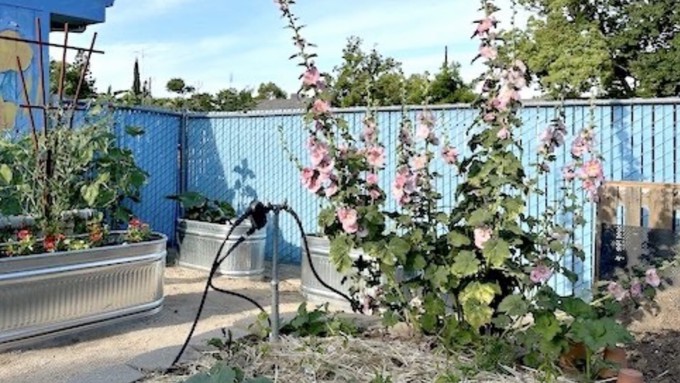
Still plenty of time for nonprofits and schools to apply

The Tahoe Park Neighborhood Association Community Garden was among the most recent recipients of the Saul Wiseman Garden Grants, presented by the Sacramento Perennial Plant Club. Photo by Risë Ryan, courtesy Sacramento Perennial Plant Club
With school starting again, the region's garden groups and community nonprofits also swing back into action soon. It's a good time to remind them all that grants are available for area gardening projects from local garden clubs. It's not too early to put the application deadlines on the calendar.
The Folsom Garden Club presents grants each year to nonprofit organizations within the city of Folsom. The funds are raised each year from the club's garden tour, and they typicaly are distributed in amounts from $200 to $1,500. The submission deadline this year is Oct. 11.
The grants committee evaluates applications with the following criteria:
-- The botanical, horticultural, historic, and/or educational interest of the project.
-- The community impact of the project: The project location, public access, and interest, etc.
-- The planning, future maintenance and/or monitoring of the project: How it was developed and how it will be executed and maintained.
-- Funding history and plans: Other sources of funds, current budget, and goals for future funding.
The application and other information can be found here: https://www.folsomgarden.org/2023-grant-application/
Incidently, the Folsom Garden Club also offers scholarships for college students in Placer, Sacramento, El Dorado or Yolo County pursuing degrees in horticulture, landscape design, botany or related topics. Application deadline for the 2024-25 academic year is April 15, 2024. More information is available here.
Another grant program is offered by the Sacramento Perennial Plant Club. The Saul Wiseman Gardening Grants, the club notes, are awarded annually to nonprofit groups, schools and community groups within Sacramento County. The funds are intended to help with gardening projects or activities that emphasize education, service and enhancement to the area's diverse community.
This past year, the club presented grants to four schools and three other gardens: the Grassland Garden at Niños Parkway in South Natomas, the Project AWE Youth Farm in Elk Grove, and the Tahoe Park Neighborhood Association Community Garden.
The deadline for these grant applications is Jan. 12, 2024. The application form can be downloaded at https://sacplants.org/grants/
Comments
0 comments have been posted.Sacramento Digs Gardening to your inbox.
Food in My Back Yard Series
May 6: Maintain soil moisture with mulch for garden success
April 29: What's (already) wrong with my tomato plants?
April 22: Should you stock up on fertilizer? (Yes!)
April 15: Grow culinary herbs in containers
April 8: When to plant summer vegetables
April 1: Don't be fooled by these garden myths
March 25: Fertilizer tips: How to 'feed' your vegetables for healthy growth
March 18: Time to give vegetable seedlings some more space
March 11: Ways to win the fight against weeds
March 4: Potatoes from the garden
Feb. 25: Plant a fruit tree now -- for later
Feb. 18: How to squeeze more food into less space
Feb. 11: When to plant? Consider staggering your transplants
Feb. 4: Starting in seed starting
Sites We Like
Garden Checklist for week of May 11
Make the most of the lower temperatures early in the week. We’ll be back in the 80s by Thursday.
* Plant, plant, plant! It’s prime planting season in the Sacramento area. Time to set out those tomato transplants along with peppers and eggplants. Pinch off any flowers on new transplants to make them concentrate on establishing roots instead of setting premature fruit.
* Direct-seed melons, cucumbers, summer squash, corn, radishes, pumpkins and annual herbs such as basil.
* Harvest cabbage, lettuce, peas and green onions.
* In the flower garden, direct-seed sunflowers, cosmos, salvia, zinnias, marigolds, celosia and asters. (You also can transplant seedlings for many of the same flowers.)
* Plant dahlia tubers.
* Transplant petunias, marigolds and perennial flowers such as astilbe, columbine, coneflowers, coreopsis, dahlias, rudbeckia and verbena.
* Keep an eye out for slugs, snails, earwigs and aphids that want to dine on tender new growth.
* Feed summer bloomers with a balanced fertilizer.
* For continued bloom, cut off spent flowers on roses as well as other flowering plants.
* Add mulch to the garden to maintain moisture. Mulch also cuts down on weeds. But don’t let it mound around the stems or trunks of trees or shrubs. Leave about a 6-inch-to-1-foot circle to avoid crown rot or other problems.
* Remember to weed! Pull those nasties before they set seed.
* Water early in the day and keep seedlings evenly moist.